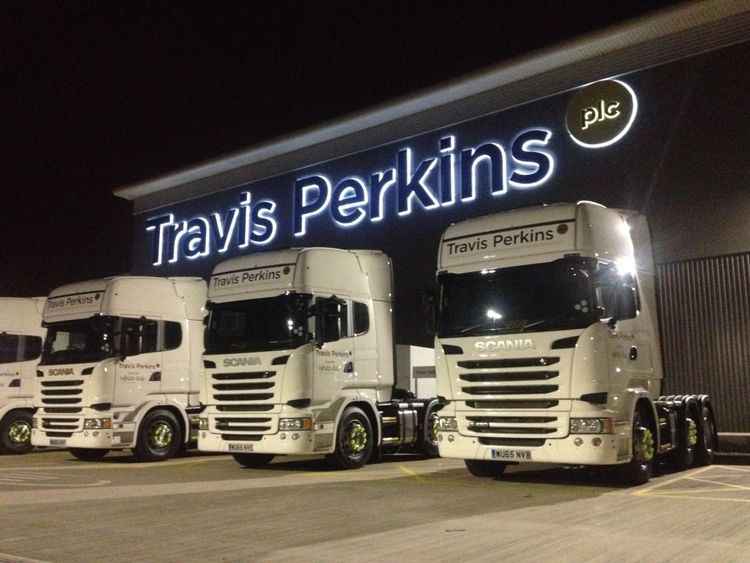It was only a coincidence – but the publication of lacklustre GDP data on the same day Travis Perkins updated investors on current trading will have made the builder’s merchant’s task easier.
For what they show is that the business actually appears to be defying the current gloom engulfing the construction sector.
While the latter suffered a 3.3% quarter-on-quarter contraction during the first three months of the year, Travis Perkins actually enjoyed a highly creditable 3% rise in its like-for-like sales, driven by a remarkable 19.7% increase in its plumbing and heating division, which includes the City Plumbing Supplies, City Heating Spares, Primaflow and National Shower Spares brands.
That follows a substantial improvement in the business which, in recent years, had been struggling amid intense competition.
Meanwhile, like-for-like sales in the general merchanting division, which includes the core Travis Perkins brand, fell by just 1.3%, a better performance than might have been expected given the industry backdrop.
That was the good news.
The bad news was that the company’s consumer division, which includes the Wickes, Tile Giant and Toolstation brands, suffered a 4.6% drop in its like-for-like sales.
:: Obvious Brexit link in economic slowdown
The company blames this on “poor weather conditions and the current weakness in the UK do-it-yourself market”.
That weakness has been plain for all to see. Kingfisher, owner of the UK’s largest DIY chain B&Q, saw its share price melt last month after reporting a 2.8% fall in full year like-for-like sales at the business – intensifying to a 5% drop during the final three months of 2017.
Its chief executive, Veronique Laury, said the outlook was uncertain and described consumer confidence as “just terrible”, adding that B&Q had suffered from fewer people entering its stores and had suffered from “softer demand for big ticket items such as kitchens”.
Ms Laury has since then mused publicly about a return to the high street and, instead of more out of town warehouse-style stores, opening smaller outlets – potentially marking a revival of local ironmongers – as well as stepping up click and collect services.
If things have been bad at Kingfisher, they have been worse still at Homebase, the UK’s second largest DIY chain.
Its woes, however, have been largely self-inflicted following its £340m takeover, less than two years ago, by the Australian retail giant Wesfarmers.
It decided to rebrand Homebase to Bunnings, the name under which it trades Down Under, which has a far more macho image and which is geared more towards builders and professionals.
Wesfarmers has now written off more than the purchase price, put the business up for sale and, in the meantime, earmarked between 20 and 30 stores for closure.
Compared with that, the drop in sales in the consumer division at Travis Perkins during the first three months of 2018 does not look at all bad.
Clyde Lewis, of stockbroker Peel Hunt, said of Travis Perkins’s update: “It could have been much worse, given the weather and second-hand housing market backdrop.”
But Graeme Kyle, of Shore Capital, added a more cautionary note, pointing out that sales in the consumer division were probably flattered by the early timing of Easter, traditionally a very important sales period for DIY stores and garden centres.
He said: “Adjusted for Easter, consumer would have been -6%, marking a continuation of the steep cyclical downswing we are seeing in UK DIY spending.”
That consumers are spending less doing up their homes has also been apparent in recent trading updates from Carpetright, which has offered its shareholders the first glimmer of light in a while, revealing on Thursday that its creditors had approved a Company Voluntary Arrangement that will enable it to shut 92 stores and reduce its rents at 113 others.
Topps Tiles, another company heavily exposed to the home improvement market, is another to recently have warned of tougher trading – only some of which could be explained by the bad weather in March.
The old rule of thumb for home improvement and DIY chains were that, even if house prices were falling, they would benefit from people spending more on doing up their homes.
The UK is not quite yet in the territory of falling house prices but, with Nationwide Building Society today predicting house price growth of just 1% for the rest of the year, the market is pretty tepid.
Nor are people moving home as much: statistics published on Thursday by HM Revenue & Customs revealed that there were just 267,800 housing transactions during the first three months of the year, a shocking fall of one-fifth on the same period last year. That points to a very subdued market which cannot all be blamed on the weather.
Even though wages are now growing at a slightly faster rate than inflation, for the first time in a year, it would probably be unwise for DIY retailers to expect too much of an improvement in their fortunes just yet.
From – SkyNews


